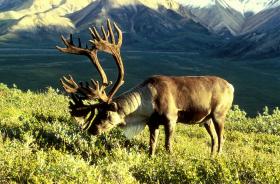Study Suggests Climate Change May Reduce Caribou Habitat
Wildfires and the caribou population are the subject of a new study released by the University of Alaska Fairbanks and the US Geological Survey. KDLG’s Chase Cavanaugh has more on the data and its implications.
“There seems to be more frequent wildfire events as the century progresses, and what that results in is younger forests containing less lichen-producing winter habitat.”
The study says higher temperatures increase the flammability of forests, and predicts that by the end of the century, the Porcupine caribou herd will lose 21% of its winter habitat by the end of the century. Brinkman says this habitat loss will have a direct effect on where these populations graze, and by extension, villages that depend on them.
“If caribou may be avoiding these young forests, and these burns are occurring near a community, that may mean that these caribou are wintering in different areas away from communities. There’s certain communities in the Porcupines Winter Range that depend on that herd, and if there’s a lot more young forest, they may be spending more time in tundras or other areas.”
While the study didn’t address this directly, Brinkman says other research indicates wildfires may also harm local trail systems, hindering the efforts of caribou hunters.
“When a burn comes through, depending on the severity, it can really cause a lot of destruction to trail networks around these rural areas. As you probably know, there’s not a very good road network around most of these rural communities in Alaska, so they depend on these trail systems to get to their subsistence areas, and if there’s more fires ripping through, they’re going to spend more time trying to repair trails, or they may lose those trail systems altogether.”
The study says unlike Porcupine caribou, the Central Arctic variety is less likely to suffer from habitat loss due to mainly grazing on the tundra.
The full study is available on the PLOS ONE website.











No comments:
Post a Comment